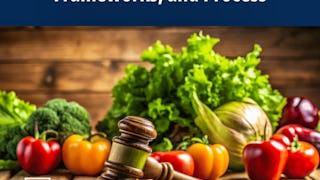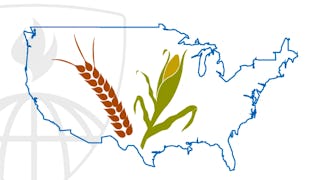In today’s global food system, understanding how food regulations shape what we eat, how it’s labeled, and how it’s imported is more important than ever. Navigating U.S. Food Regulations: Safety and Enforcement is a dynamic 4-week Coursera course that explores the complex landscape of U.S. food laws, enforcement mechanisms, and the role of advocacy in shaping policy. From the Food Safety Modernization Act (FSMA) to the regulation of dietary supplements and infant formula, learners will gain a practical understanding of how food safety is maintained and how consumer protection is enforced. Led by instructor Dr. Jessica Hartke, you’ll explore how regulations evolve in response to public health needs and industry practices.

Entdecken Sie neue Fähigkeiten mit 30% Rabatt auf Kurse von Branchenexperten. Jetzt sparen.


Empfohlene Erfahrung
Was Sie lernen werden
Discover how genetics, microbiome, and AI shape personalized nutrition and health outcomes.
Understand U.S. nutrition policy, food assistance programs, and their impact on public health.
Explore food labeling, safety laws, and regulatory frameworks through expert-led frameworks and models.
Kompetenzen, die Sie erwerben
- Kategorie: Case Studies
- Kategorie: Legal Risk
- Kategorie: Good Manufacturing Practices
Wichtige Details

Zu Ihrem LinkedIn-Profil hinzufügen
August 2025
6 Aufgaben
Erfahren Sie, wie Mitarbeiter führender Unternehmen gefragte Kompetenzen erwerben.

In diesem Kurs gibt es 4 Module
In the course orientation, you'll get to know the course, your classmates, and our learning environment, and gain the technical skills needed. Then, learn how advocacy groups influence food policy and regulation in the U.S. You will also learn how global organizations and U.S. agencies work together to ensure that imported foods meet safety and labeling standards. By the end of this module, you'll be able to explain how both domestic and international efforts help shape the food supply available to U.S. consumers.
Das ist alles enthalten
9 Videos5 Lektüren2 Aufgaben1 Diskussionsthema
In this module, you will learn how the U.S. regulates special categories of foods, including medical foods, infant formula, and dietary supplements. These products serve unique roles in health and nutrition and are subject to specific rules for safety, labeling, and ingredient use. You’ll explore how key laws like the Infant Formula Act and the Dietary Supplement Health and Education Act (DSHEA) define these categories and guide FDA oversight. By the end of this module, you’ll be able to identify how each of these special foods is regulated and what makes them different from conventional foods.
Das ist alles enthalten
8 Videos2 Lektüren1 Aufgabe
In this module, you will learn how food regulations are enforced in the U.S. through the work of key federal agencies like the FDA and USDA. You’ll explore the difference between labeling and advertising and understand why each is regulated differently. The module also covers enforcement tools such as recalls, withdrawals, safety alerts, and FDA warning letters. By the end of this module, you’ll be able to explain how enforcement actions help protect consumers and ensure companies follow food laws.
Das ist alles enthalten
10 Videos2 Lektüren1 Aufgabe
In this module, you will explore how food regulations are enforced through real-world examples and learn how consumers can take legal action when regulations fall short. You’ll examine case studies involving mislabeled or unsafe products and understand the role of private litigation and class-action lawsuits in protecting consumer rights. At the conclusion of this module, you will be ready to complete the final assessment for the course and earn your Coursera certificate!
Das ist alles enthalten
7 Videos6 Lektüren2 Aufgaben
Erwerben Sie ein Karrierezertifikat.
Fügen Sie dieses Zeugnis Ihrem LinkedIn-Profil, Lebenslauf oder CV hinzu. Teilen Sie sie in Social Media und in Ihrer Leistungsbeurteilung.
Dozent

Mehr von Nutrition entdecken

University of Illinois Urbana-Champaign

University of Illinois Urbana-Champaign
 Status: Vorschau
Status: VorschauCoursera Instructor Network
 Status: Vorschau
Status: VorschauJohns Hopkins University
Warum entscheiden sich Menschen für Coursera für ihre Karriere?





Neue Karrieremöglichkeiten mit Coursera Plus
Unbegrenzter Zugang zu 10,000+ Weltklasse-Kursen, praktischen Projekten und berufsqualifizierenden Zertifikatsprogrammen - alles in Ihrem Abonnement enthalten
Bringen Sie Ihre Karriere mit einem Online-Abschluss voran.
Erwerben Sie einen Abschluss von erstklassigen Universitäten – 100 % online
Schließen Sie sich mehr als 3.400 Unternehmen in aller Welt an, die sich für Coursera for Business entschieden haben.
Schulen Sie Ihre Mitarbeiter*innen, um sich in der digitalen Wirtschaft zu behaupten.
Häufig gestellte Fragen
Yes! Although completion of the Coursera course alone is not credit-bearing, it is a required component of a graduate-level Canvas course that can be "stacked" toward advanced credentials such as an academic (transcriptable) graduate certificate or a degree. If you decide to pursue further education, the credits you earn from this course can be applied toward a formal academic program, provided that you meet all the requirements of admission to the certificate or degree.
To access the course materials, assignments and to earn a Certificate, you will need to purchase the Certificate experience when you enroll in a course. You can try a Free Trial instead, or apply for Financial Aid. The course may offer 'Full Course, No Certificate' instead. This option lets you see all course materials, submit required assessments, and get a final grade. This also means that you will not be able to purchase a Certificate experience.
When you enroll in the course, you get access to all of the courses in the Specialization, and you earn a certificate when you complete the work. Your electronic Certificate will be added to your Accomplishments page - from there, you can print your Certificate or add it to your LinkedIn profile.
Weitere Fragen
Finanzielle Unterstützung verfügbar,
 enthalten
enthalten
